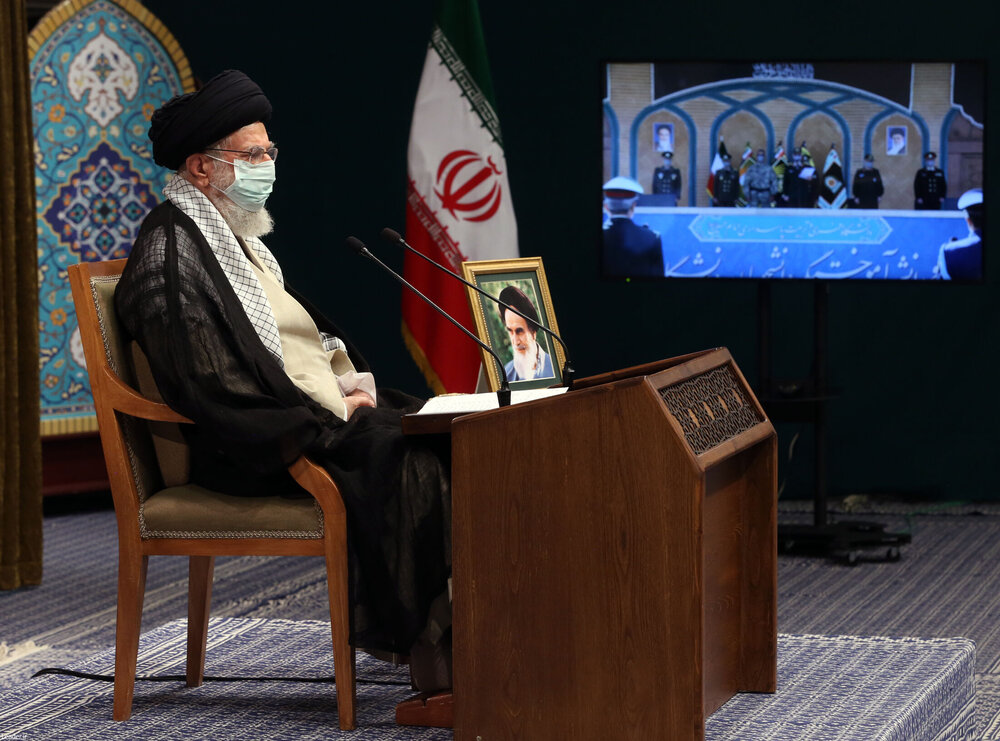Consequences of trust to U.S. in words of Leader

TEHRAN — In a speech delivered on Sunday morning, the Leader of the Islamic Revolution discussed the AUKUS pact, Iran-Azerbaijan disagreements, and the scandalous U.S. withdrawal from Afghanistan.
Referred to the AUKUS pact, the Leader said, “In the recent tensions between the Europeans and the United States, in which the Europeans have declared that the Americans have stabbed them in the back, the main point is that the Europeans need to secure themselves with their own forces, regardless of NATO, whose main sponsor is the U.S.”
This is in line with what Iran has been saying for three years, since the United States unilaterally withdrew from the JCPOA in May 2018. The Europeans blindly trusted their ally, and this is what happened. A breach of trust.
The United States signed a trilateral partnership with the United Kingdom and Australia, dubbed AUKUS on September 15. The pact is aimed to provide Australia with nuclear-powered submarines.
The EU, and in particular France, severely protested the deal. The deal came as a heavy blow to the France, economically. They lost a major economic deal. Some say they lost over $56 billion, some say $66 billion, and the Guardian even said France lost a $90 billion deal. Now, Paris has gone from viewing Australia and the United States as a friend and ally to nations which can’t be trusted.
The AUKUS pact turned the attention of political commentators and analysts to a theory first put forward in 2013, and renewed by EU foreign policy chief Josep Borrell in December 2020.
“Because the world has changed. It is difficult to claim to be a ‘political union’ able to act as a ‘global player’ and as a ‘geopolitical Commission’ without being ‘autonomous.’
What are then the factors that make this concept more relevant than ever?” Borrell asked in his article titled “Why European strategic autonomy matters”.
In the article published on the EU website, he added, “The first is that the weight of Europe in the world is shrinking. Thirty years ago, we represented a quarter of the world's wealth. It is foreseen that in 20 years, we will not represent more than 11% of world GNP, far behind China, which will represent double it, below 14% for the United States and at par with India.”
Borrell also discusses “the transformation of economic interdependence,” as the Europeans have greatly invested on, particularly through “the defense of multilateralism”.
“Today we are in a situation where economic interdependence is becoming politically very conflictual. And what was traditionally called soft power is becoming an instrument of hard power,” he cautioned.
The theory of European strategic autonomy seems to be pursued more strictly than before, in view of Washington’s betrayal of the European bloc by forming an Angelo-Saxon alliance. Washington did it without informing the EU. In the words of French Foreign Minister Le Drian it is a “breach of trust”.
It is sad to see that the European Union has reached this decision to distance itself from the United States so late. The former Iranian Foreign Minister, Mohammad Javad Zarif, repeatedly warned the EU to act independently, and not follow the U.S. blindly, yet, the Europeans decided to violate their commitments to the JCPOA.
In another part of his speech, the Leader called reliance on foreign forces for providing security as “just an illusion,” saying that those who have such imaginations will soon face “a blow.”
Iran has repeatedly made it known to its neighbors and regional countries that security cannot be purchased from outside. Maybe, it is time for the EU bloc and the West Asia region to listen to Iran.
SA/PA
